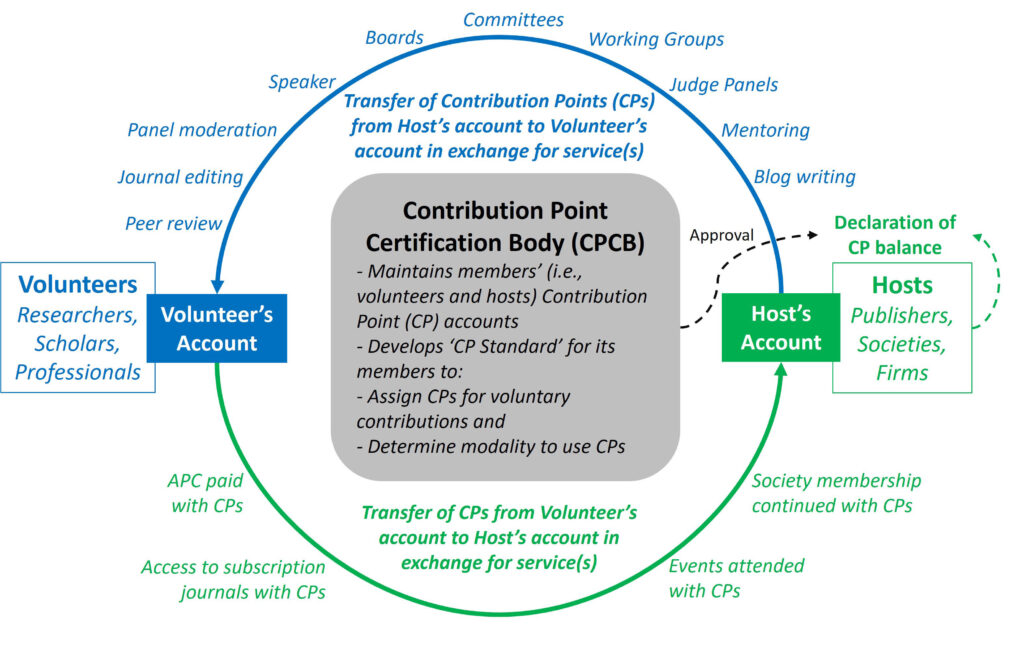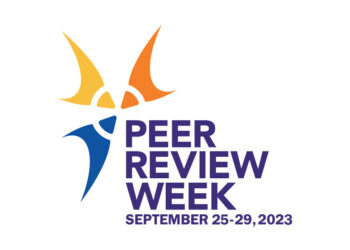In a recent piece on the use of AI outside the publishing workflow, I advocated for a ‘Voluntary Contribution Transaction System’ (VCTS). The rationale behind it is straightforward: individual scholars and professionals make numerous voluntary contributionsto the scholarly ecosystem by reviewing and editing for journals, designing and moderating panel discussions, being on different boards, committees, and working groups, mentoring early-career professionals, being award and competition judges, and writing blog posts, to name just a few. Many of these activities are already recognized in different forms, for example, through The Royal Society’s Résumé for Researchers, universities’ evaluation and promotion rules, and awards given by scholarly publishing organizations. But these contributions are largely not valued in a concrete manner across the publishing landscape. We therefore need a system that will not only recognize voluntary contributions, but will also give tangible benefits to the volunteers. Hence, the VCTS.
Of course, we have seen some recent developments in this arena. We see direct cash compensation as well as tradable and non-tradable token systems as a means of tangible benefits. Since 2022, for example, OASPA has been offering two types of honorariafor the program committee members/session chairs and the invited speakers of its conferences, respectively, and individuals can claim the amounts at their discretion.
PeerJ has a tradable token system, but only for its reviewers and editors, and in turn for its potential authors. For example, one token is equivalent to US$10 and by reviewing a paper one can earn 10 tokens. These tokens can be used only to get an article processing charge (APC) discount at PeerJ. If all coauthors’ total token value is equivalent to the APC, they can get 100% of the APC waived. These tokens are also shareable and can be transferred to PeerJ accountholders who can’t pay for full APCs.
Recently, a blockchain-supported token reward system has been proposed for research funders’ use. By capitalizing on the participatory, decentralized, transparency, and trust-building characteristics of blockchain, this system will award academics tokens for undertaking important, but usually unpaid and professionally unrecognized tasks (e.g., acting as reviewers of proposals, being member of advisory committees, or submitting project reports). These tokens may not be traded or monetized, but could be considered as an authentic record of a person’s voluntary contributions to the research system. Therefore, the tokens could be used in job interviews, funding or award applications review, and performance appraisals, for example.
Scholar Freedom has gone a few steps further and invented a system which helps researchers to generate money from their research in two ways. In the first path, a research reader can directly pay a researcher if they are interested in learning more about the latter’s work. When the whole venture is big enough to generate profit, the second option comes in, where the annual profits will be redistributed among the members of Scholar Freedom. Although this model doesn’t directly deal with voluntary contributions, it showcases why the well-guarded “prestige economy” in scholarly ecosystem could be and should be disrupted by monetizing research outputs.

Structure and function of VCTS
A potential structure for a VCTS can be seen in Figure 1. This system would operate within the space of “volunteer economy”, where volunteerism is the currency, whether or not it disrupts the existing scholarly ecosystem.
The VCTS has three basic components: 1) Contribution Points (CPs), 2) Contribution Point Certification Body (CPCB), and 3) Contribution Point Transaction (CPT).
1) Contribution Points (CPs):
Every recognized voluntary contribution by an individual (volunteer) to the scholarly system, as listed above, will have points, which will be called ‘Contribution Points’ (CP). For example, reviewing a manuscript could be worth 10 points, organizing a panel 20 points, speaking at a webinar 10 points, mentoring someone for six months 30 points, and writing a 500-word blog post 5 points. How these points will be determined, accumulated, and used as currency are explained below.
2) Contribution Point Certification Body (CPCB):
Although I have given examples of CPs for a single voluntary activity, it may, and should vary from organization to organization. In the case of publishers, this could be based on their annual revenue; for journals, based on their citation metrics or other appropriate indicators; and for a learned society/association, based on their membership size, annual revenue, and/or reach (e.g., geographical, institutional or sectoral diversity of its membership, and activities). The CPs for a single activity may also vary based on the effort (e.g., in hours) needed from a volunteer. But who should decide on that?
There needs to be ‘Contribution Point Certification Bodies’ (CPCBs), a role that could be played by interested scholarly publishing associations. As a first task, a concerned CPCB should develop a ‘CP Standard’, which would include, for example:
- Eligibility of an activity to be counted as a voluntary contribution;
- Criteria to measure individual’s contribution(s) under that activity; it may be calculated based on hour-effort needed;
- Amount CPs to be assigned for each contribution;
- Determining the use of CPs, i.e., how many CPs will be equivalent to APCs, journal subscription/paywall fees, society membership fees, or event registration fees (see details of CP use below); and
- Factors that may create variation in these CPs and their use, based on the host organization’s portfolio or efforts needed from the volunteers.
Each member (i.e., publishers, societies, firms, or individuals) of a scholarly publishing association will register and open an account to be part of the VCTS managed by the association’s respective CPCB. In case of individuals, this account will be linked to their ORCID iDs. A VCTS will be managed by the concerned CPCB as a contribution to its association’s members.
If an accountholder (e.g., publisher, society, or firm) is planning to ‘host’ activities which require volunteers, it will declare an opening balance of CPs that they can afford based on the voluntary contributions they may need in a given period (calendar year or fiscal year). For example, a journal will estimate how much peer reviewers’ voluntary effort (converted into CPs) it will need over a period of time. It is the responsibility of the concerned CPCB to approve that opening balance of CPs, which may be linked to the annual turnover of the accountholder (host).
3) Contribution Point Transaction (CPT):
The CPT would take place in two ways. i) If an accountholder is a ‘volunteer’ (essentially a researcher/scholar/professional), they will directly receive the CPs from the hosts’ VCTS accounts with the same CPCB to their own account in exchange for their voluntary contributions. These CPs will not expire as long as the volunteer’s account is maintained with the same CPCB.
The ‘volunteer’ accountholders can use their accumulated CPs to pay APCs and journal subscription/paywall fees to the journals/publishers who have accounts with the same CPCB. Similarly, CPs could be used to pay membership fees to societies, or to pay registration fees to attend events, as determined by the concerned CPCB (as described above).
Benefits of VCTS
The first benefit of VCTS is all voluntary contributions by researchers/professionals to scholarly and research systems can potentially get due recognition and validation, and are permanently recorded as tradable items. Second, this will encourage scholarly professionals to join in voluntary work at a global scale, given the possible earning of tradable points. In this way, VCTS will not only expand the volunteer pool, but will also allow volunteers to join in activities (e.g., publishing in OA journals, and attending events) that are otherwise challenging due to limited funding (e.g., for individuals from the low- and middle-income countries and early-career professionals). Finally, VCTS will improve diversity, equity, inclusion, and accessibility (DEIA) in scholarly ecosystem at multiple levels, in all possible dimensions, those depend on volunteers.
Challenges of VCTS
The primary challenge of building a VCTS is convincing the members of the participating organizations and companies that a VCTS is a good thing to have and benefits the greater good. This conversation brings in another layer of challenge because a VCTS may mean loss of cash revenue by participating organizations from different fees and payments, which would affect their profit margin, economic stability, and organizational development. If these challenges can be settled among say, a publishing association’s members, then the association can invest time and resources to act as a CPCB. Once several CPCBs are established and functioning, a second-generation challenge would be to synergize different CP Standards of different CPCBs so that free transactions of CPs are possible among accountholders/members of different CPCBs.
The next (or the first) step
We should now begin having conversations on the idea of a VCTS in scholarly publishing societies’ working groups, at annual meetings, and potentially through webinars to get thoughts and feedback on the feasibility of implementing such a system. We also need to detail out the roadmap to establish the first VCTS which indeed has the potential to make the highly inequitable publishing industry moving further towards equity.
Altruism and volunteerism are good; but ensuring equity for the volunteers is far better.
Discussion
8 Thoughts on "Building a Voluntary Contribution Transaction System"
or you know instead of propping up a whole system of monopoly money, tokens, blockchains and whatnots in order to support the volunteer economy of scholarly communication, how about simply paying them for services rendered? and letting them spend that real cash on whatever they want/need?
i mean i like it as an idea; it’s an intricate and detailed and pretty well thought out system at first glance, but it feels like it’s creating unneccessary complexity where we should be striving for simplicity
Thanks for your support to paying cash for voluntary services in the academic publishing arena. I also support the idea of making things simple. But the publishing ecosystem is already a very complex place and getting more complex day-by-day. For example, the biggest and well-studied voluntary service in the scholarly publishing is peer review (https://researchintegrityjournal.biomedcentral.com/articles/10.1186/s41073-021-00118-2). And the idea of paying for peer review has been heavily criticized (https://scholarlykitchen.sspnet.org/2021/06/16/whats-wrong-with-paying-for-peer-review/ ; https://www.thelancet.com/journals/lancet/article/PIIS0140-6736(22)01057-1/fulltext ). And we don’t see any real progress in monetizing peer review and any other voluntary services across the scholarly landscape. Thus, this idea of non-monetary transaction system.
but it is monetary, just indirectly so (you review a no. of papers, you earn tokens, when you earn enough you exchange them for services like APCs if you want to publish, or subscriptions if you want to read stuff — instead of paying the full price you get your tokens deducted from the total). or perhaps i need to take a second glance at the system you propose.
it needn’t be complex and personally i’d be happier reviewing a paper for like $30-$50 that i choose how to spend, than for 3-5 tokens i can only spend in some very specific ways and only at specific venues participating in the scheme
Worth noting that the Company of Biologists used to pay a nominal fee (I believe around $25) to peer reviewers. This practice was halted at the request of the reviewers, as the paperwork involved in receiving the payment (filling out tax forms, providing bank information) took more time than it was worth. Does a small payment like this bias peer review away from particular types of researchers or particular geographies where the amount paid is nominal compared to typical salaries? Would this then fail as a means to normalize peer review across the global research population?
Either route suggested means a significant increase in infrastructure (the ability to incorporate, track, and apply Haseeb’s proposed tokens or the bookkeeping of tracking, issuing, and paying taxes on huge numbers of payments). These costs will be borne either by the authors or the subscribers (if any still exist).
1) it’s ought to be borne by the publisher that markets its management of peer review as the #1 value add thing it does
2) the ‘let’s keep it volunteer because the fee is nominal for global north folks’ approach fails as the means of normalizing peer review globally just as well
having that nominal fee be optional would be a good middle ground approach — so those for whom it’s indeed nominal and not worth the admin hassle can volunteer, while those for whom it is more than nominal can pad their budgets a bit while providing an essential service to publishers
it’s ought to be borne by the publisher that markets its management of peer review as the #1 value add thing it does
So publishers with large margins that can take on this additional expense are to be favored over small publishers or those who strive to break even (or run at a subsidized loss)?
the ‘let’s keep it volunteer because the fee is nominal for global north folks’ approach fails as the means of normalizing peer review globally just as well
I wasn’t proposing “let’s keep it volunteer” as a means of providing equity, just noting that your solution (like many offered in scholarly communication) eliminates one form of inequity while creating another, simply shifting the problem to a new community rather than solving it.
As for making it an optional approach, again, more overhead, tracking who has opted in and who has opted out (on top of all the work of making the actual payments). Again, it’s too blithe to just suggest publishers should eat all of those costs as 1) many publisher run on small or even non-existent margins, and 2) for profit companies are unlikely to voluntarily forego profit. I’m not sold on Haseeb’s solution, but at least he’s suggesting a route to cheaper shared infrastructure and costs being paid out of future (potentially increased) business rather than existing funds, as most journals would likely accept discounted APCs if it means collecting more of them.
David, it’s not an either/or situation. people are not automatons (yet), they mostly have empathy and agency, they can discern the well-off publishers from the ones running on a shoestring, and in an optional nominal fee system they can choose not to volunteer for the former ones, while choosing to volunteer for the latter ones — just as they do now with boycotting reviewing for this or that publisher
it would create more global equity (researcher-wise) than inequity (publisher-wise) in any case
(2) is on point and the reason why a more complex solution with tokens is probably more palpable to publishers — can’t argue with business logic unfortunately
Interesting piece. I wondered if you were aware of ReviewerCredits, which also offers a credit (worth €10) for each verified journal peer review, and the credits can then be redeemed for a wide variety of editing, publishing, translating, etc. services. (Their previous reward center allowed credits to be used for charitable purposes like planting trees, but they have recently transitioned to this new focus for rewards.) I’m not affiliated with them, just an end user of their system, but they came immediately to mind when I read your description of the PeerJ token system.



